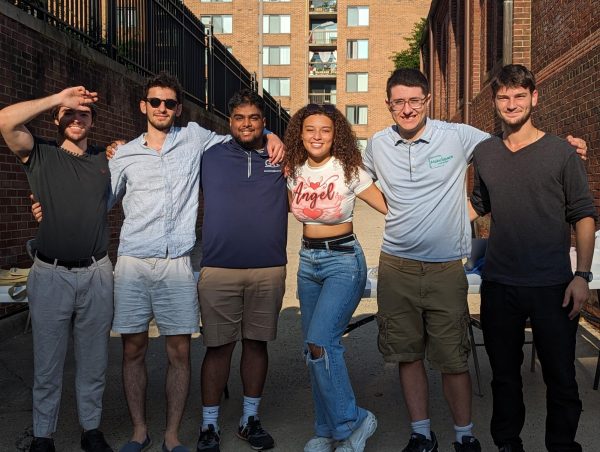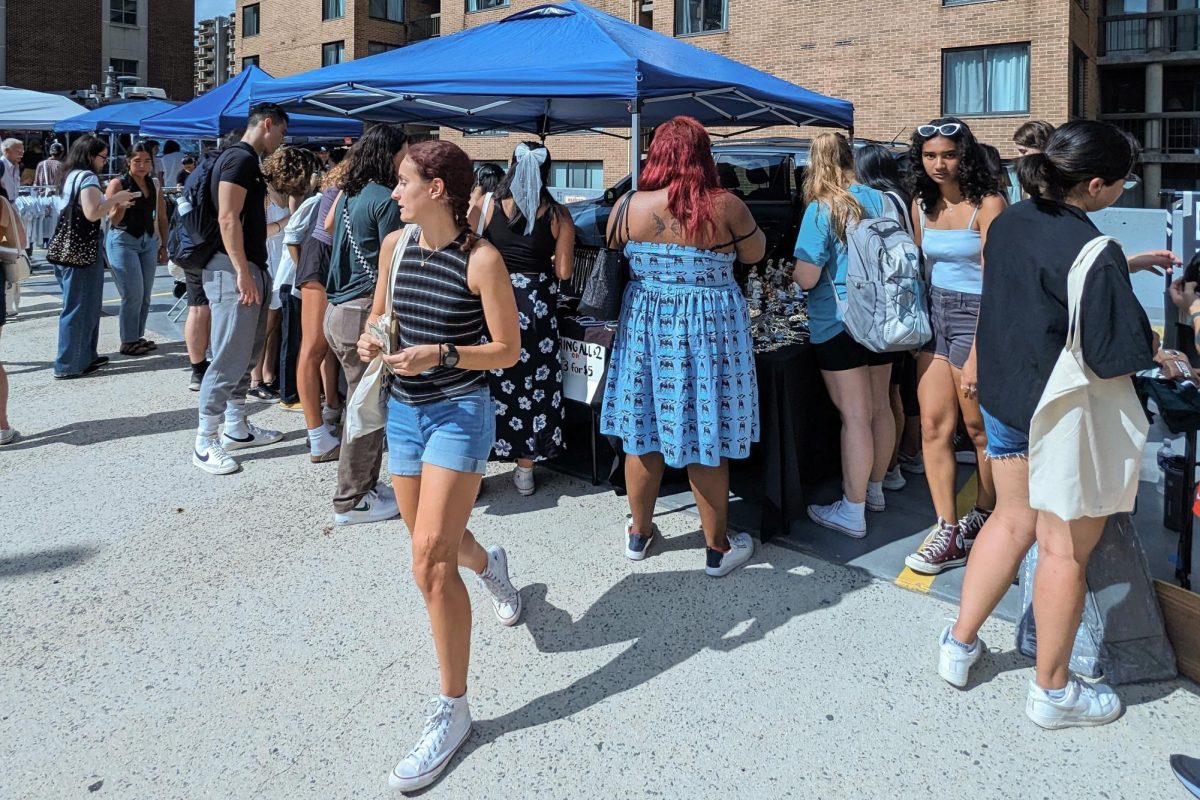An organization for student entrepreneurs hosted a flea market late last month, drawing crowds of community members who perused posters, clothing, vinyl records and handmade knick-knacks sold by student businesses and local vendors.
Startup Sustainability GW, a student organization that promotes student entrepreneurs, hosted a flea market between St. Mary’s Church and Lerner Health and Wellness Center on Aug. 26, which showcased the work of 20 local D.C. vendors and GW student businesses. Members of the organization’s executive board said the flea market drew roughly 3,500 students and that they plan to make the markets a weekly occurrence before the start of the spring semester.
Junior Jake Anszelowicz, the founder and president of Startup Sustainability GW, said the organization provides student entrepreneurs the resources to interact with the local community by instilling a “culture of hard work.” Anszelowicz said businesses at the flea market sell everything from clothing, home goods, tools, jewelry, antiques and collectibles, to coffee, ice cream and homemade baked goods.
“We’re really a tight-knit, strong community because we just support entrepreneurs and that’s our main goal,” he said.

Anszelowicz said he oversees Startup Sustainability GW through his nonprofit organization Startup Avenue, which he founded in fall 2021 with GW alum Anas Mheir. He said the organization — which is self-funded and supports 15 entrepreneur startups at GW, including Make Space GW and the GW Entrepreneurship Club — provides space and promotion to startup businesses, and aims to establish a supportive community where all entrepreneurs feel valued.
Anszelowicz said Startup Sustainability GW uses revenue from the flea markets to provide student businesses with space, materials and advice about entrepreneurship to help sell their products and that the local and student vendors at the market came to Startup Sustainability GW seeking their support and resources to boost their businesses.
“We support them financially, with ideas formulation, collaboration, networking, resources and through expertise,” Anszelowicz said.
Anszelowicz said future flea markets will not exactly replicate the first event because leaders plan to design each market based on student feedback and observations of what students liked and didn’t like about each market.
“You want to adapt to what people want,” Anszelowicz said. “So if the students like clothing, which was our guess that they like clothing, jewelry and keychains and things like that, then that’s what we’ll give them.”
Aidan Richards, a 2023 GW alum who advises Anszelowicz and serves as the vice president of Startup Sustainability GW, said organizers of the Georgetown flea market invited organization members to table at their market last spring. The tabling inspired organization leaders to bring flea markets to GW as an outlet to provide goods for community members while promoting the work of student businesses and local vendors.
“Here’s an opportunity for your hard work to pay off by setting up at the flea market where you can sell your goods and meet other people and promote your products,” Richards said.
Richards said he considers the first flea market just the beginning of Startup Sustainability GW’s endeavors, which acted as a “test” to gauge how popular the events would be among GW community members and interested vendors.
“The flea market is one thing that we have been working on that is going to continue,” Richards said. “That was essentially an early test pilot of who we have in our network in terms of who has a product that’s viable to sell and also supports the people we have been working with.”
Arni Seth, a sophomore majoring in international business, sold baked goods at the flea market after starting a baking business called Dollop Bakes in her freshman year of high school, where she sold treats for weddings and corporate meetings. She said the flea market gave her the means to continue promoting her business in the GW community.
She said Startup Sustainability GW provided her with tables, chairs and space to set up and that the organization’s members did a “phenomenal” job at establishing connections with vendors and contacting a wide, diverse range of businesses at the market.
“I really didn’t know what to expect in terms of the popularity and the organization, but they did an incredible job and I was really, really excited to be a part of it,” Seth said. “The people in charge of this club are so organized, and they are really such go-getters.”
Seth said one of the most rewarding aspects of selling her products is sharing her experiences with others. She said the “fulfillment” and “pride” she gets from selling her goods motivates her to balance running Dollop Bakes with attending GW.
“I just get so much joy out of sharing baked goods with people and sharing my food with people,” she said.





